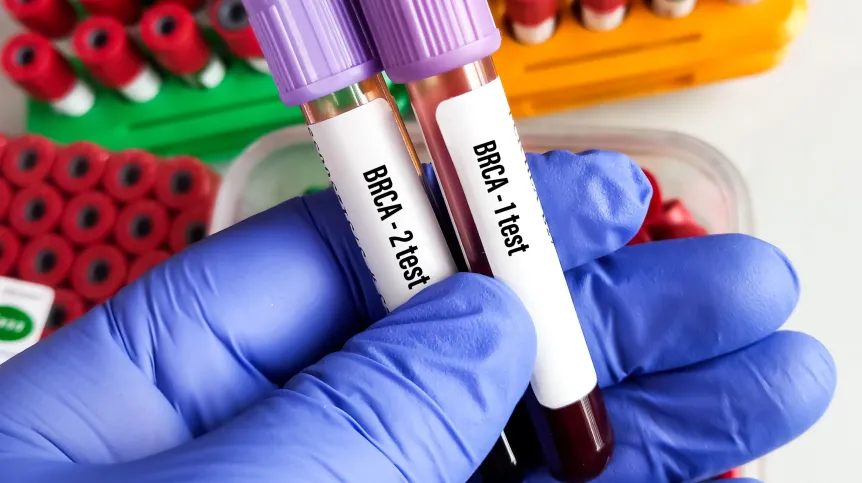
BRCA gene mutations, best known for their role in the development of breast and ovarian cancers, are also associated with pancreatic cancer and prostate cancer in men, experts remind.
Therefore, first-degree relatives of men with prostate cancer associated with hereditary BRCA mutations should also be tested for the presence of these mutations, they argue.
BRCA gene mutations have entered the public consciousness in part due to the media-reported Angelina Jolie story. Due to the family risk of developing breast and ovarian cancer associated with a mutation in the BRCA1 gene, the actress decided to have a prophylactic mastectomy (removal of the breasts) and then a prophylactic removal of her ovaries. Thanks to her story, the number of women testing for mutations in the BRCA1/BRCA2 genes has increased significantly.
'We now know that the four cancers most dependent on BRCA gene mutations are: breast cancer, ovarian cancer, pancreatic cancer and prostate cancer. BRCA mutations are not just a female problem. Among patients with prostate cancer, the frequency of BRCA gene mutation carriers is similar to that in breast and ovarian cancer - 5-10 percent', says Paweł Potocki, a clinical oncologist from the Department and Clinic of Oncology at the Jagiellonian University Medical College. In his opinion, it is important for this to become common knowledge among patients.
'It is worth identifying people with these mutations before they develop malignant tumours. They can then be included in more frequent preventive tests', the expert adds.
Therefore, in the case of a patient with breast or ovarian cancer associated with a BRCA gene mutation, genetic testing should cover not only women among her first-degree relatives, but also men. 'If a woman has a mutation in the BRCA genes, her sons could also inherit it, and having this mutation is associated with an increased risk of pancreatic or prostate cancer', the expert explains.
If, on the other hand, the father is a carrier of a mutation in the BRCA gene, his daughter may inherit this mutation from him and have a higher risk of developing breast or ovarian cancer.
Potocki points out that a mutation in the BRCA1/BRCA2 genes can affect prostate tumour cells only and then it is not inherited (so-called somatic, acquired mutation), in contrast to an inherited, germinal mutation, which affects all cells of the body.
'The currently consensus of scientific societies is that testing for mutations in the BRCA1 and BRCA2 genes in tumour cells should be performed in all patients with metastatic prostate cancer, because in the case of the presence of a BRCA mutation, we can use molecularly targeted drugs, designed to selectively act on cells with the mutation', the expert explains.
He adds that when the presence of a mutation in the tumour is confirmed, it is necessary to check whether it is a hereditary (germinal) mutation or whether it concerns only the tumour (somatic mutation). For this purpose, healthy tissue is sent for genetic testing.
Scientific societies recommend that tests for hereditary BRCA mutations should be performed in some patients with more advanced prostate cancer, but without metastases yet. However, there is no consensus as to which patients these are, Potocki says.
'Every patient with detected germinal mutation should be referred to a genetic clinic. The patient's first-degree relatives (siblings, adult children - ed. PAP) should also receive a referral to this clinic from a primary care physician', the oncologist explains.
While in the case of relatives, the detection of a BRCA mutation may affect preventive measures, in the case of a patient with prostate cancer it helps to select the most effective treatment option.
'Prostate cancer in patients with BRCA mutations is usually more advanced at the time of diagnosis, and more aggressive', Potocki says. He adds that these tumours are also less sensitive to chemotherapy, which a standard in the treatment of prostate cancer.
Molecularly targeted drugs, so-called PARP inhibitors, are intended for these patients. 'At the moment in Poland, we have reimbursed olaparib for patients with prostate cancer with BRCA1/BRCA2 mutations. It can be prescribed to patients who have previously undergone at least two lines of treatment. In addition, since January, niraparib has been available in combination with abiraterone acetate. However, there are other drugs from this group registered in the world and in some countries they are already used to treat patients', Potocki explains.
During the Medical National Interest debate in October, Iwona Skoneczna, PhD, Head of the Chemotherapy Department at the Grochó`w Hospital in Warsaw, assessed that BRCA mutation testing in patients could be performed earlier - at a stage when standard hormonal treatment (so-called androgen deprivation) has stopped working. 'Knowing that the patient is a BRCA 1/BRCA 2 mutation carrier, the patient could be referred for more intensive treatment earlier, which could prevent the disease from spreading (metastasising - ed. PAP)', she explained.
Potocki emphasises that the latest studies indicate that the combination of PARP inhibitors with new-generation hormonal treatment (new-generation antiandrogens - abiraterone acetate and enzalutamide) brings better results in patients with prostate cancer than the use of each of these therapies separately. Individual studies examined the effectiveness of the combination of olaprib with abiraterone acetate, niraparib with abiraterone acetate, and talazoparib with enzalutamide in patients who had previously received standard hormone therapy only.
'These two groups of drugs demonstrate synergy of action, which is why treatment with them in combination gives better results than the sum of the effects of the individual therapies', the expert explains. He adds that in Poland this configuration of drugs is not reimbursed yet.
Potocki points out that the results of studies on the combination of PARP inhibitors with new antiandrogens indicate high effectiveness of this therapy also in patients with prostate cancer with mutations other than BRCA, but with a similar effect on the cell, and effectiveness - although lower - in patients without detected mutations. 'This results from the synergy of action of these drugs', the expert says.
That is why combination therapy is registered for all patients with castration-resistant prostate cancer, regardless of mutation status.
'As doctors, we would like to be able to treat all patients with prostate cancer with this therapy, in accordance with the registration record', Potocki concludes. (PAP)
PAP - Science in Poland, Joanna Morga
jjj/ zan/ amac/













